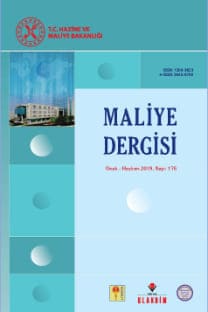Küresel Büyüme ve Ticaret İlişkisinde Uzun Vadeli Dönüşüm
Long-term Transformation in the Global Growth and Trade Correlation
___
Abiad, A., Mishra, P. ve Topalova, P. (2014), “How does Trade Evolve in the Aftermath of Financial Crises?”, IMF Economic 62, 213-247.Ahmed, U., Bieron, B. ve Melin, H. (2015), “Supporting the Micro- Multinationals to Help Achieve Peak Trade”, B. Hoekman (ed.), Global Trade Slowdown: A New Normal içinde, A VoxEU.org eBook, 317-327.
Anderson, J. (2011), “The Gravity Model”, Annual Review of Economics 3(1), 133-160.
Backus D.K., Kehoe, P.J. ve Kydland, F.E. (1995), Frontiers of Business Cycle Research, Cooley T. (ed.), "International Business Cycles: Theory and Evidence" içinde, Princeton University Press, Princeton, 331-356.
Baldwin, R. (2011), Trade and Industrialisation After Globalisation's 2nd Unbundling: How Building and Joining a Supply Chain are Different and Why It Matters, NBER Working Paper No.17716.
Baumol, W.J. (2002), “Entrepreneurship, Innovation and Growth: David- Goliath Smbiosis”, Journal of Entrepreneurial Finance, 7(2), 1-10.
Bernard, A.B., Jensen, B.J., Redding, S.J. ve Schott, P.K. (2007), “Firms in International Trade”, Journal of Economic Perspectives, 21(3), 105-130.
Borin A., Di Nino, V., Mancini, M. ve Sbracia, M. (2016), “The Cyclicality of the Income Elasticity of Trade”, Bank of Italy, Economic Research and International Relations Area, Working Paper, 1126.
Boz, E., Bussiere, M. ve Marsilli, C. (2014), “Recent Slowdown in Global Trade: Cyclical or Structural,” VoxEU.org (Erişim Tarihi: 12.11.2014) Buono, I. ve Vergara-Cafarelli, F. (2013), “Trade Elasticity and Vertical Specialization”, Bank of Italy, Working Paper 924.
Constantinescu, C., Mattoo, A. ve Ruta, M. (2015), “Global Trade Slowdown”, B. Hoekman (ed.), Global Trade Slowdown: A New Normal içinde, A VoxEU.org eBook, 33-53.
Engel C. ve Wang, J. (2011), “International Trade in Durable Goods: Understanding Volatility, Cyclicality, and Elasticities”, Journal of International Economics, 83, 37-52.
Escaith, H ve Miroudot, S. (2015), “World Trade and Income Remain Exposed to Gravity”, B. Hoekman (ed.), Global Trade Slowdown: A New Normal içinde, A VoxEU.org eBook, 127-160.
Evenett, S.J. (2014), The Global Trade Disorder: The 16th GTA Report, London: CEPR Press.
Ferrantino, M. ve Taglioni, D. (2014), “Global Value Chains in the Current Trade Slowdown”, World Bank Economic Premise. 137.
Freund, C. (2009), “The Trade Response to Global Downturns: Historical Evidence”, World Bank Policy Research Working Paper Series 5015, Washington, DC.
Furman, J. (2015), “Trade, Innovation, and Economic Growth”, Remarks by the Chairman of the Council of Economic Advisers, Brookings Institution.
Hattem, J. ve Trujillo, M. (2015), “Overnight Tech: Net Neutrality Vote, at Long Last”, the Hill.
Heathcote J.ve Perri, F. (2002), “Financial Autarky and International Business Cycles”, Journal of Monetary Economics (49), 601,627.
Irwin, D. (2002), “Long-run Trends in World Trade and Income”, World Trade Review 1(1), 89-100.
Jensen, B. ve Kletzer, L. (2006), “Tradable Services: Understanding the Scope and Impact of Services Offshoring”, S. Collins ve L. Brainard (ed.), Brookings Trade Forum 2005, Offshoring White Collar Work içinde, Washington, DC: Brookings Institution.
Kee, H.L. ve Tang, H. (2014), “Domestic Value Added in Exports: Theory and Firm Evidence from China,” World Bank, Washington, DC,CESifo Working Paper Series No. 5614.
Kharas, H ve Seidel, B. (2018), What’s Happening to the World Income Distribution? The Elephant Chart Revisited, Brookings Institution, https://www.brookings.edu/research/whats-happening-to-the-world-inco me-distribution-the-elephant-chart-revisited/ (Erişim Tarihi: 02.04.2018)
Lakner, J. ve Milanovic, B. (2013), “Global Income Distribution From the Fall of the Berlin Wall to the Great Recession”, The World Bank, Policy Research Working Paper, 6719.
Lakner, J. ve Milanovic, B. (2016), “Global Income Distribution From the Fall of the Berlin Wall to the Great Recession”, The World Bank Economic Review, 30(2), 203-232.
Martinez-Martin, J. (2016), “Breaking Down World Trade Elasticities: A Panel ECM Approach”, Federal Reserve Bank of Dallas Globalization and Monetary Policy Institute, Working Paper No.275.
McKinsey Global Institute (2016), Digital Globalization: The New Era of Global Flows (Erişim Tarihi: 05.08.2018)
Miroudot, S., Sauvage, J. ve Shepherd, B. (2013), “Measuring the Cost of International Trade in Services”, World Trade Review 12(4), 719-735.
OECD (2014), “OECD Services Trade Restrictiveness Index (STRI) Policy Brief”, Background Report prepared for the Meeting of the Council at Ministerial Level, 6-7 Mayıs.
Ollivaud, P. ve C. Shwellnus (2015), "Does the Post-Crisis Weakness of Global Trade Solely Reflect Weak Demand?", OECD Economic Department Working Paper, Sayı: 1216.
Rodrik, D. (2016), “Straight Talk on Trade”, Project Syndicate, https://www.project-syndicate.org/commentary/trump-win-economistsresponsible- by-dani-rodrik-2016-11 (Erişim Tarihi: 15.11.2016)
Rodrik, D. (2017), “Is Global Equality the Enemy of National Equality?”, Yayınlanmamış Makale, J.F. Kennedy School of Government, Harvard University.
Slopek, U. (2015), "Why has the Income Elasticity of Global Trade Declined?", Deutsche Bundesbank, Mimeo.
Srinivasan, M., Stank, T., Dornier, P. ve Petersen, K. (2014), Global Supply Chains: Evaluating Regions on an EPIC Framework-Economy, Politics, Infrastructure, and Competence, New York: McGraw-Hill.
Stratford, K. (2015), “Explaining the Structural Slowdown in World Trade”, Bank of England Econ Bulletin.
Varian, H. (2005), “Technology Levels the Business Playing Field”, New York Times, 25.08.2005, https://www.nytimes.com/2005/08/25/business/ technology-levels-the-business-playing-field.html (Erişim Tarihi: 05.11.2016).
Veenendaal, P., Lejour, A., Rojas-Romagosa, H. ve Kox, H. (2015), “A Value-Added Trade Perspective on Recent Patterns in World Trade”, B. Hoekman (ed.), The Global Trade Slow-Down: A New Normal içinde, A VoxEU eBook, 161-179.
World Bank (2015), “What Lies Behind the Global Trade Slowdown?”, Chapter 4 in Global Economic Prospects, Washington, DC: World Bank.
World Trade Organization (2018), World Trade Statistical Review 2018, https://www.wto.org/english/res_e/statis_e/wts2018_e/wts18_toc_e.htm (Erişim Tarihi: 04.08.2018)
- ISSN: 1300-3623
- Yayın Aralığı: Yılda 2 Sayı
- Başlangıç: 1973
- Yayıncı: Hazine ve Maliye Bakanlığı
Ülke Risk Göstergelerinin Toplam Faktör Verimliliği Üzerindeki Etkisi: Türkiye Üzerine Bulgular
Cari Açık, Bütçe Açığı ve Yatırım-Tasarruf Açığı Bağlamında Türkiye’nin Üçüz Açık Analizi
BİROL KARAKURT, SUAT HAYRİ ŞENTÜRK, BURAK ŞAHİNGÖZ
Küresel Büyüme ve Ticaret İlişkisinde Uzun Vadeli Dönüşüm
Türkiye’nin Mali Performansının Ölçülmesi: Endeks Yaklaşımı
Askeri Harcamalar ve Ekonomik Büyüme İlişkisi: Panel Eşbütünleşme ve Nedensellik Analizi
TANER TURAN, MESUT KARAKAŞ, HÜSEYİN ALPEREN ÖZER
Vergi Uyuşmazlıkları Bakımından Makul Sürede Yargılanma Hakkı1
Abdullah TEKBAŞ, BETÜL HAYRULLAHOĞLU
Dış Borçlar ve Ekonomik Büyüme: Türkiye Ekonomisinde 1970-2014 Dönemi İçin Ampirik Bir İnceleme
